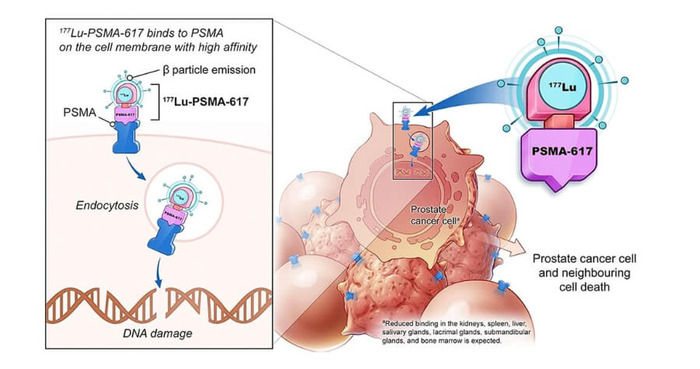Oncology is developing as a medical field, as a result of which both therapeutic and diagnostic methods are becoming more effective. With radionuclide techniques, doctors can detect distant metastases. However, conventional PET can detect metastatic lesions as small as 1 cm, while PSMA PET can detect even minimal tumors as small as 2 mm. You can undergo your diagnostics with Lutetium PSMA PET in Germany to determine the exact stage of cancer, prepare for treatment, or assess its effectiveness.
What is PSMA PET?
PSMA PET is a radionuclide diagnostic method for prostate cancer. The essence of this procedure is the following:
- Administration of a radiopharmaceutical agent containing a small amount of radioactive substance.
- The drug is absorbed by tumor tissues because they contain PSMA (prostate-specific membrane antigen). This substance is a target for the drug.
- Subsequent scanning detects areas of radiopharmaceutical agent accumulation.

PSMA PET is usually used in combination with CT scanning and less frequently with MRI scanning, as these methods provide doctors with more detailed imaging of the examined organs.
PSMA PET allows for:
- Distinguishing cancer from a benign tumor
- Clarifying the boundaries of the neoplasm
- Detecting metastases of any localization
- Detecting recurrent cancer
- Assessing the effectiveness of therapy
Indications for PSMA PET
PSMA PET is not a mandatory diagnostic method for prostate cancer. The diagnosis is usually confirmed through a biopsy, and the stage of cancer is determined using CT or MRI scanning.
PSMA PET, however, has higher accuracy, especially in the diagnosis of advanced stages of the disease, and is therefore required for some patients. The indications for the procedure are the following:
- Doubts about the diagnosis when staging the disease, for example, if doctors cannot find metastases when PSA levels are high
- Signs of prostate cancer recurrence: if doctors suspect tumor recurrence (PSA levels are high), but radiation diagnostic methods have failed to detect the tumor
- Assessment of the objective response to treatment (degree of tumor shrinkage) as a result of systemic prostate cancer therapy
PSMA PET for PSMA therapy
Radioligand Lutetium-177 therapy has been increasingly used in Germany in recent years. This treatment involves using higher doses of radioactive substances attached to ligands, which are molecules that selectively bind to PSMA, thereby delivering the radiopharmaceutical directly to cancer cells.

Lutetium PET scanning can be performed in the following cases:
- When preparing for the use of radioactive Lutetium for prostate cancer treatment to clarify the location and size of tumor foci and assess whether the tumor can accumulate the radiopharmaceutical agent
- When monitoring treatment to check how effective the cancer treatment has been and whether it is worth continuing it
Lutetium in medicine thus allows for successful diagnostics and treatment of malignant prostate tumors. Radionuclide techniques are effectively used in Germany, even in severe cases such as metastatic castration-resistant prostate cancer. You are welcome to visit the Booking Health website to find out the cost of Lutetium treatment and choose a medical care program for your preferred dates. Our website offers the best clinics for the treatment of prostate cancer. When you make your treatment appointment through Booking Health, the prices for medical services will be lower than usual for you due to the absence of taxes for foreign patients. The Booking Health specialists will help you select the best medical center and take care of all the arrangements for your trip.
